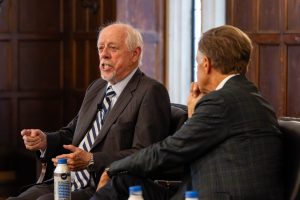Two former Tennessee governors emphasized the need for bipartisan dialogue in the modern United States at an event at Georgetown University Sept. 23.
Phil Bredesen, a Democrat who served as governor from 2003 to 2011, and Bill Haslam, a Republican who served as governor from 2011 to 2019, now co-host the podcast “You Might Be Right,” where they discuss U.S. politics and explore ways to find common ground across opposing viewpoints. Moderated by psychology professor Abigail Marsh, the discussion was the first signature event of the Georgetown Dialogues Initiative, which aims to promote civil discourse of opposing opinions among students and members of the Georgetown community.
Haslam said he and Bredesen share similar philosophies about appreciation for dialogue with people you disagree with.
“We differ in some things, but there are a lot of things that we agree on, but one of the primary things we agree on is why I’m encouraged that you’re here,” Haslam said at the event. “We both think government really matters, and it bothers us that more and more people are frustrated and exhausted by the whole process.”

The Baker School of Public Policy at the University of Tennessee launched “You Might Be Right” in September 2022. The podcast aims to reflect the character of former senator Howard Baker, who was known to frequently cross party lines.
Haslam said someone’s political ideology is a product of their personal experience, not a conscious choice.
“A lot of us make decisions for reasons that we don’t sit down and totally analyze,” Haslam said.
Bredesen said differences between the parties are not permanent, with Democrats holding certain views today that Republicans held in the past.
“While I think there’s real differences in the ways people think about things between liberals and conservatives, it is not at all as absolute as people tend to make it,” Bredesen said at the event.
Haslam said today’s parties refuse to compromise with one another, making productive legislating difficult.
“Compromise has become a really bad word. Whichever party you’re in, it’s become politically bad for you to compromise with the other side.” Haslam said. “The problem is, I think our Constitution was written with compromise as the subtext.”
Haslam said his and Bredesen’s shared background outside of politics is what allows them to find solutions.
“We both came from a result-oriented background that said the challenge is actually to solve the problem,” Haslam said. “It’s not to beat the other guy.”
Haslam said his experiences with campaigning taught him a lot about different communities in Tennessee and their values.
“The process of running for office — it forces you out of the bubble that you live in, and you realize, ‘Everybody doesn’t think like I do,’” Haslam said.
Bredesen also said that after discussing health care with a fellow Tennessean, he realized analyzing issues from a compassionate perspective instead of an analytical view would help him find common ground with his constituents.
“I was making the mistake of thinking like a technocrat or a very top-down view of what this system might look like and be designed,” Bredesen said. “What I needed to do was, instead, put myself in the shoes of one of these people in this world and say, what do I need from the health care system?”
Luke Keller (CAS ’28), a student who attended the event, said he enjoyed hearing from leaders who were passionate about making a difference in people’s lives, not winning an argument.
“We definitely have a tendency to settle and get fed up and not seek progress, but just that reminder that it’s there; you just got to keep pushing for it,” Keller told The Hoya.
Haslam said decision-making in politics is complex, and there are usually valid arguments on both sides of a political issue.
“I think one of the things you walk away from this incredible university is this: to try to understand the other side of the argument, because I guarantee you there’s a good argument,” Haslam said. “Now you might, again, not agree with it, but listen enough to understand the other side of the argument. It’ll be worth your time.”